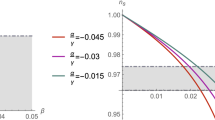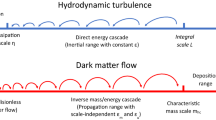Abstract
(I) IT is familiar that the Einstein equations for the density and pressure in a uniform universe:  do not suffice to specify the model since there are two equations and three unknown functions, ρ, p and R. A very common assumption is p = 0, but models involving both positive and negative values of p have also been proposed. McCrea1 pointed out that there is no objection in principle to negative pressure and that the steady-state universe can be interpreted in this way.
do not suffice to specify the model since there are two equations and three unknown functions, ρ, p and R. A very common assumption is p = 0, but models involving both positive and negative values of p have also been proposed. McCrea1 pointed out that there is no objection in principle to negative pressure and that the steady-state universe can be interpreted in this way.
This is a preview of subscription content, access via your institution
Access options
Subscribe to this journal
Receive 51 print issues and online access
$199.00 per year
only $3.90 per issue
Buy this article
- Purchase on Springer Link
- Instant access to full article PDF
Prices may be subject to local taxes which are calculated during checkout
Similar content being viewed by others
References
McCrea, W. H., Proc. Roy. Soc., A, 206, 562 (1951).
McVittie, G. C., General Relativity and Cosmology, 150 (London, 1964).
Dirac, P. A. M., Proc. Roy. Soc., A, 268, 57 (1962).
McVittie, G. C., General Relativity and Cosmology, 193 and 203 (London, 1964).
Author information
Authors and Affiliations
Rights and permissions
About this article
Cite this article
WHITTAKER, J. A Cosmological Model. Nature 209, 491–492 (1966). https://doi.org/10.1038/209491a0
Issue Date:
DOI: https://doi.org/10.1038/209491a0
This article is cited by
-
Whitrow-Randall's relation and Brans-Dicke cosmology
General Relativity and Gravitation (1990)
Comments
By submitting a comment you agree to abide by our Terms and Community Guidelines. If you find something abusive or that does not comply with our terms or guidelines please flag it as inappropriate.



